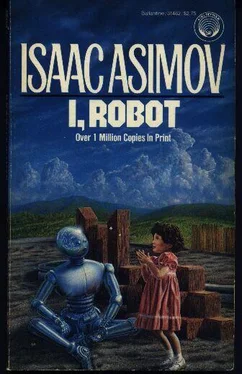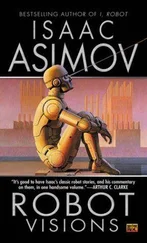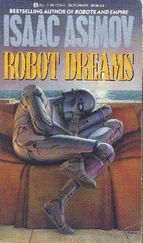Isaac Asimov - I, Robot
Здесь есть возможность читать онлайн «Isaac Asimov - I, Robot» весь текст электронной книги совершенно бесплатно (целиком полную версию без сокращений). В некоторых случаях можно слушать аудио, скачать через торрент в формате fb2 и присутствует краткое содержание. Жанр: Фантастика и фэнтези, на английском языке. Описание произведения, (предисловие) а так же отзывы посетителей доступны на портале библиотеки ЛибКат.
- Название:I, Robot
- Автор:
- Жанр:
- Год:неизвестен
- ISBN:нет данных
- Рейтинг книги:5 / 5. Голосов: 2
-
Избранное:Добавить в избранное
- Отзывы:
-
Ваша оценка:
- 100
- 1
- 2
- 3
- 4
- 5
I, Robot: краткое содержание, описание и аннотация
Предлагаем к чтению аннотацию, описание, краткое содержание или предисловие (зависит от того, что написал сам автор книги «I, Robot»). Если вы не нашли необходимую информацию о книге — напишите в комментариях, мы постараемся отыскать её.
I, Robot — читать онлайн бесплатно полную книгу (весь текст) целиком
Ниже представлен текст книги, разбитый по страницам. Система сохранения места последней прочитанной страницы, позволяет с удобством читать онлайн бесплатно книгу «I, Robot», без необходимости каждый раз заново искать на чём Вы остановились. Поставьте закладку, и сможете в любой момент перейти на страницу, на которой закончили чтение.
Интервал:
Закладка:
"And you said, 'Have your boys check them and make sure, anyway.'"
"Susan, you read my mind. It was what I said, and he said he couldn't."
"Too busy?"
"No, he said that no human could. He was frank about it He told me, and I hope I understand him properly, that the Machines are a gigantic extrapolation. Thus- A team of mathematicians work several years calculating a positronic brain equipped to do certain similar acts of calculation. Using this brain they make further calculations to create a still more complicated brain, which they use again to make one still more complicated and so on. According to Silver, what we call the Machines are the result of ten such steps."
"Ye-es, that sounds familiar. Fortunately, I'm not a mathematician. Poor Vincent. He is a young man. The Directors before him, Alfred Lanning and Peter Bogert, are dead, and they had no such problems. Nor had I. Perhaps roboticists as a whole should now die, since we can no longer understand our own creations."
"Apparently not. The Machines are not super-brains in Sunday supplement sense, -although they are so pictured in the Sunday supplements. It is merely that in their own particular province of collecting and analyzing a nearly infinite number of data and relationships thereof, in nearly infinitesimal time, they have progressed beyond the possibility of detailed human control.
"And then I tried something else. I actually asked the Machine. In the strictest secrecy, we fed it the original data involved in the steel decision, its own answer, and the actual developments since, -the overproduction, that is,- and asked for an explanation of the discrepancy."
"Good, and what was its answer?"
"I can quote you that word for word: 'The matter admits of no explanation.' "
"And how did Vincent interpret that?"
"In two ways. Either we had not given the Machine enough data to allow a definite answer, which was unlikely. Dr. Silver admitted that. -Or else, it was impossible for the Machine to admit that it could give any answer to data which implied that it could harm a human being. This, naturally, is implied by the First Law. And then Dr. Silver recommended that I see you."
Susan Calvin looked very tired, "I'm old, Stephen. When Peter Bogert died, they wanted to make me Director of Research and I refused. I wasn't young then, either, and I did not wish the responsibility. They let young Silver have it and that satisfied me; but what good is it, if I am dragged into such messes.
"Stephen, let me state my position. My researches do indeed involve the interpretation of robot behavior in the light of the Three Laws of Robotics. Here, now, we have these incredible calculating machines. They are positronic robots and therefore obey the Laws of Robotics. But they lack personality; that is, their functions are extremely limited. Must be, since they are so specialized. Therefore, there is very little room for the interplay of the Laws, and my one method of attack is virtually useless. In short, I don't know that I can help you, Stephen."
The Co-ordinator laughed shortly, "Nevertheless, let me tell you the rest. Let me give you my theories, and perhaps you will then be able to tell me whether they are possible in the light of robopsychology."
"By all means. Go ahead."
"Well, since the Machines are giving the wrong answers, then, assuming that they cannot be in error, there is only one possibility. They are being given the wrong data! In other words, the trouble is human, and not robotic. So I took my recent planetary inspection tour-"
"From which you have just returned to New York."
"Yes. It was necessary, you see, since there are four Machines, one handling each of the Planetary Regions. And all four are yielding imperfect results."
"Oh, but that follows, Stephen. If any one of the Machines is imperfect, that will automatically reflect in the result of the other three, since each of the others will assume as part of the data on which they base their own decisions, the perfection of the imperfect fourth. With a false assumption, they will yield false answers."
"Uh-huh. So it seemed to me. Now, I have here the records of my interviews with each of the Regional Vice-Coordinators. Would you look through them with me? -Oh, and first, have you heard of the `Society for Humanity'?"
"Umm, yes. They are an outgrowth of the Fundamentalists who have kept U. S. Robots from ever employing positronic robots on the grounds of unfair labor competition and so on. The 'Society for Humanity' itself is anti-Machine, is it not?"
"Yes, yes, but- Well, you will see. Shall we begin? We'll start with the Eastern Region."
"As you say-"
The Eastern Region
a-Area: 7,500,000 square miles
b-Population: 1,700,000,000
c-Capital: Shanghai
Ching Hso-lin's great-grandfather had been killed in the Japanese invasion of the old Chinese Republic, and there had been no one beside his dutiful children to mourn his loss or even to know he was lost. Ching Hso-lin's grandfather had survived the civil war of the late forties, but there had been no one beside his dutiful children to know or care of that.
And yet Ching Hso-lin was a Regional Vice-Co-ordinator, with the economic welfare of half the people of Earth in his care.
Perhaps it was with the thought of all that in mind, that Ching had two maps as the only ornaments on the wall of his office. One was an old hand-drawn affair tracing out an acre or two of land, and marked with the now outmoded pictographs of old China. A little creek trickled aslant the faded markings and there were the delicate pictorial indications of lowly huts, in one of which Ching's grandfather had been born.
The other map was a huge one, sharply delineated, with all markings in neat Cyrillic characters. The red boundary that marked the Eastern Region swept within its grand confines all that had once been China, India, Burma, Indo-China, and Indonesia. On it, within the old province of Szechuan, so light and gentle that none could see it, was the little mark placed there by Ching which indicated the location of his ancestral farm.
Ching stood before these maps as he spoke to Stephen Byerley in precise English, "No one knows better than you, Mr. Co-ordinator, that my job, to a large extent, is a sinecure. It carries with it a certain social standing, and I represent a convenient focal point for administration, but otherwise it is the Machine! -The Machine does all the work. What did you think, for instance, of the Tientsin Hydroponics works?"
"Tremendous!" said Byerley.
"It is but one of dozens, and not the largest. Shanghai, Calcutta, Batavia, Bangkok- They are widely spread and they are the answer to feeding the billion and three quarters of the East."
"And yet," said Byerley, "you have an unemployment problem there at Tientsin. Can you be over-producing? It is incongruous to think of Asia as suffering from too much food."
Ching's dark eyes crinkled at the edges. "No. It has not come to that yet. It is true that over the last few months, several vats at Tientsin have been shut down, but it is nothing serious. The men have been released only temporarily and those who do not care to work in other fields have been shipped to Colombo in Ceylon, where a new plant is being put into operation."
"But why should the vats be closed down?"
Ching smiled gently, "You do not know much of hydroponics, I see. Well, that is not surprising. You are a Northerner, and there soil farming is still profitable. It is fashionable in the North to think of hydroponics, when it is thought of at all, as a device of growing turnips in a chemical solution, and so it is – in an infinitely complicated way.
"In the first place, by far the largest crop we deal with (and the percentage is growing) is yeast. We have upward of two thousand strains of yeast in production and new strains are added monthly. The basic food-chemicals of the various yeasts are nitrates and phosphates among the inorganics together with proper amounts of the trace metals needed, down to the fractional parts per million of boron and molybdenum which are required. The organic matter is mostly sugar mixtures derived from the hydrolysis of cellulose, but, in addition, there are various food factors which must be added.
Читать дальшеИнтервал:
Закладка:
Похожие книги на «I, Robot»
Представляем Вашему вниманию похожие книги на «I, Robot» списком для выбора. Мы отобрали схожую по названию и смыслу литературу в надежде предоставить читателям больше вариантов отыскать новые, интересные, ещё непрочитанные произведения.
Обсуждение, отзывы о книге «I, Robot» и просто собственные мнения читателей. Оставьте ваши комментарии, напишите, что Вы думаете о произведении, его смысле или главных героях. Укажите что конкретно понравилось, а что нет, и почему Вы так считаете.








